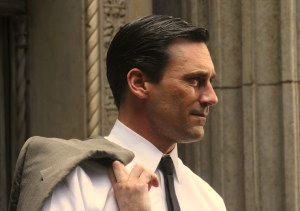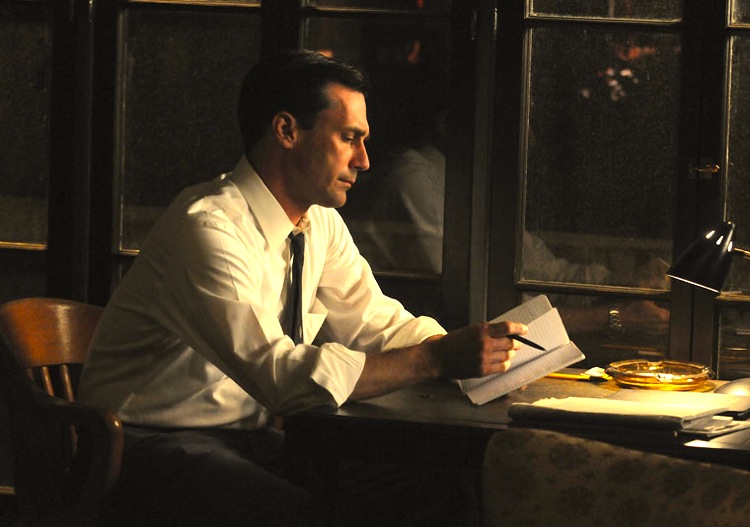By Jennifer Baldwin. I’ve always felt we do our resolutions at the wrong time of the year. New Year’s Day, in the midst of bleak winter, feels too dark, too endless for making resolutions and changing our lives. In winter, we’re just trying to survive. A change in lifestyle, a plan for improvement is too much to ask when we’re barely hanging on.
But Summer – ah, summer! Summer is the time for resolutions. It’s the time for rebirth, for changing our lives. It’s the time to finally start writing that novel, the time to finally lose those last ten pounds, the time to be reborn. It’s too bountiful and warm to be anything but a rebirth. The “Summer Man” is the man who lives fully, who faces the world with confidence and verve, who changes his life for the better because he’s sick of the dark, pallid face of life’s winter.

Last week I identified with Peggy, but this week I’m with Don. It’s a writer thing. Whenever we scribes feel down or adrift, whenever life is careening out of control, we turn to the one thing that always feels right: we write. Don’s got his notebook open, his thoughts spilling out in an epic free-write of soul-baring confessionals and existential poetry. It is through this act of writing that Don regains control of his life. It’s not just a diary or a journal for writing, “Here’s what I did today …” – it’s a way to say, “Here’s what I thought today, here’s what I fear today, here’s what I want today, and everyday, and always.” It’s a way that we writers give our lives meaning. By journaling, by solidifying our thoughts and feelings in written words, we can find a path out of the darkness. In “The Summer Man,” it seems Don is beginning to find his way out of that darkness.
He swims, he cuts back on the drinking, he gets his mojo back with the ladies. My prediction from a few weeks ago came true (sorta): Don and Faye hooked up (sorta). They had a date, the romantic sparks were flying, but unfortunately for my prognostications, they didn’t actually sleep together because Mad Men – even when it’s predictable – is never predictable. It was Don who put the kibosh on having sex with Faye. Color me surprised, but this is the new Don, the journal writing Don, the summer man Don. The Don who wants to be there for his youngest son’s birthday party. Little baby Gene shares a lot in common with Don. They were both conceived “in desperation,” their homes broken by infidelity and upheaval. But for much of last season and the beginning of this season, it seemed like Gene was more Betty’s child than Don’s. He seemed an afterthought to Don.
Things seem to change with this episode, though. Now Don yearns for his son. He seems ready to be there for baby Gene in a way that his own father was not for him. He risks the wrath of Betty to be there at the birthday party. And to Betty’s credit, she’s perfectly civil.

It’s interesting that this episode is called “The Summer Man,” when so much time is spent with the ladies of Mad Men. I could write a billion things about modern feminism and the behavior of both Joan and Peggy in reaction to Joey The Freelancer’s disgusting bullying. Suffice to say, this episode just goes to show how subtle, even-handed, and ultimately un-PC Mad Men really is when it comes to cultural politics. Peggy is the “new woman,” a trailblazer for modern feminism (even if she doesn’t know it yet). She asserts herself like a man, fires Joey, and in the biting words of Joan, confirms to the men in the office that she’s “a humorless bitch.” I’ll admit it; I fist-pumped when Peggy fired Joey. He was an ass.
But Joan is older than Peggy, and her approach is not that of the new feminism. Joan’s approach is the “old school” method of using feminine wiles to get ahead in a man’s world. Joan would have gotten the same result (no more Joey), but she would have done it in the subtler way of the female – using persuasion, discretion, and yeah, okay, a little bit of sex appeal. The show doesn’t say one approach is better than the other, but give it credit for taking the wind out of Peggy’s sails and showing that women were being assertive and getting what they wanted (through uniquely feminine means) long before the “humorless bitch” brigade of modern radical feminism came on the scene. Continue reading Mad Men Season Four: Episode 8, “The Summer Man,” and Episode 9, “The Beautiful Girls”








